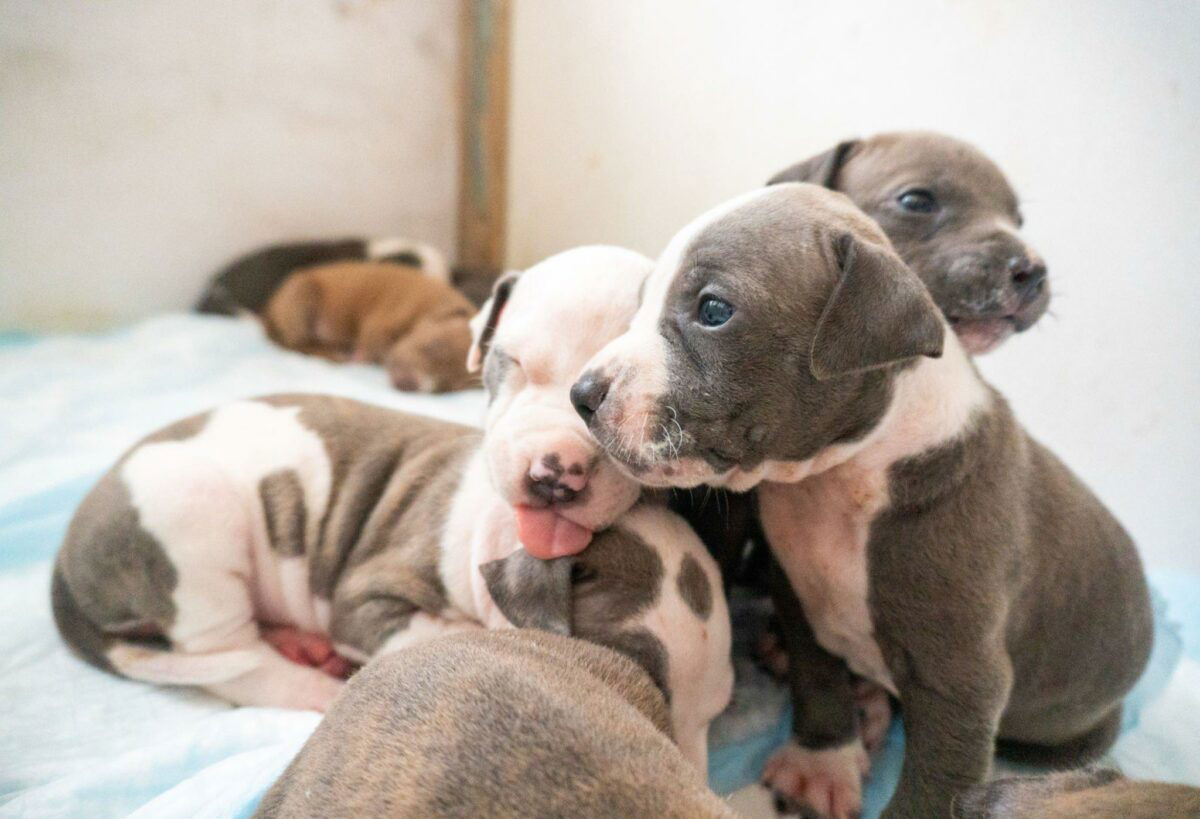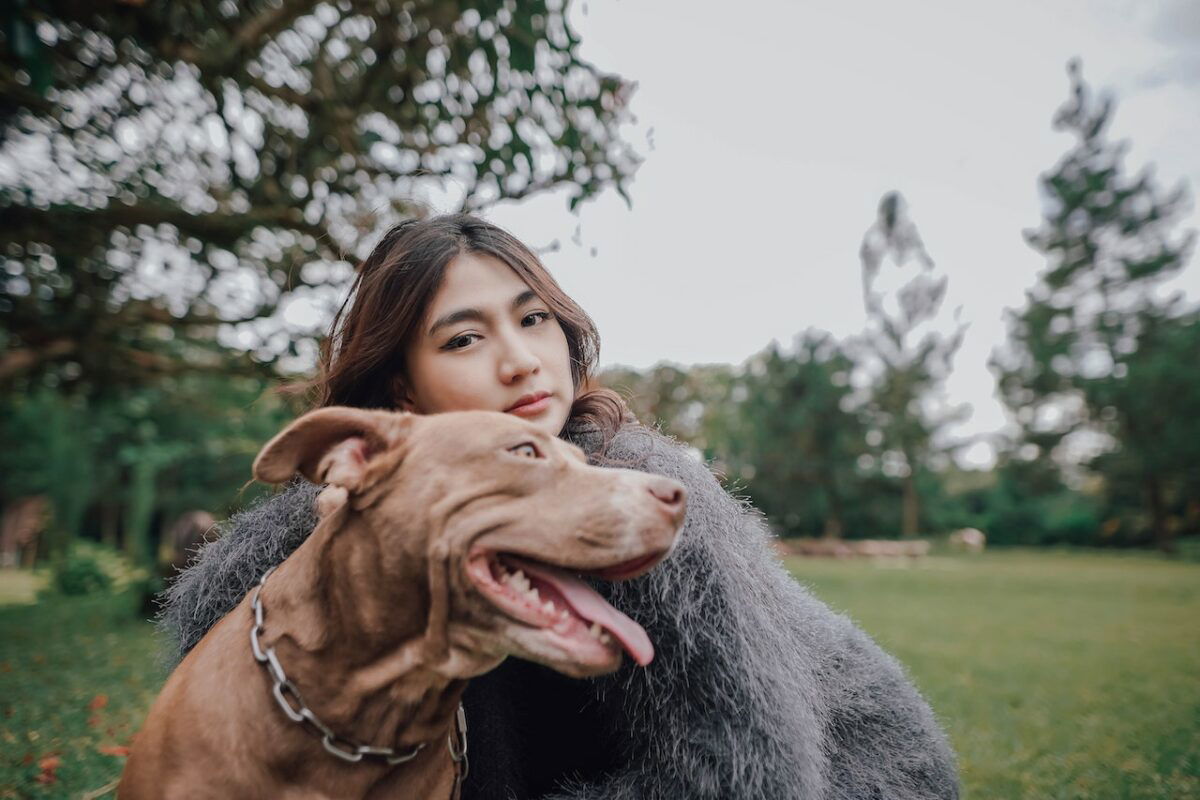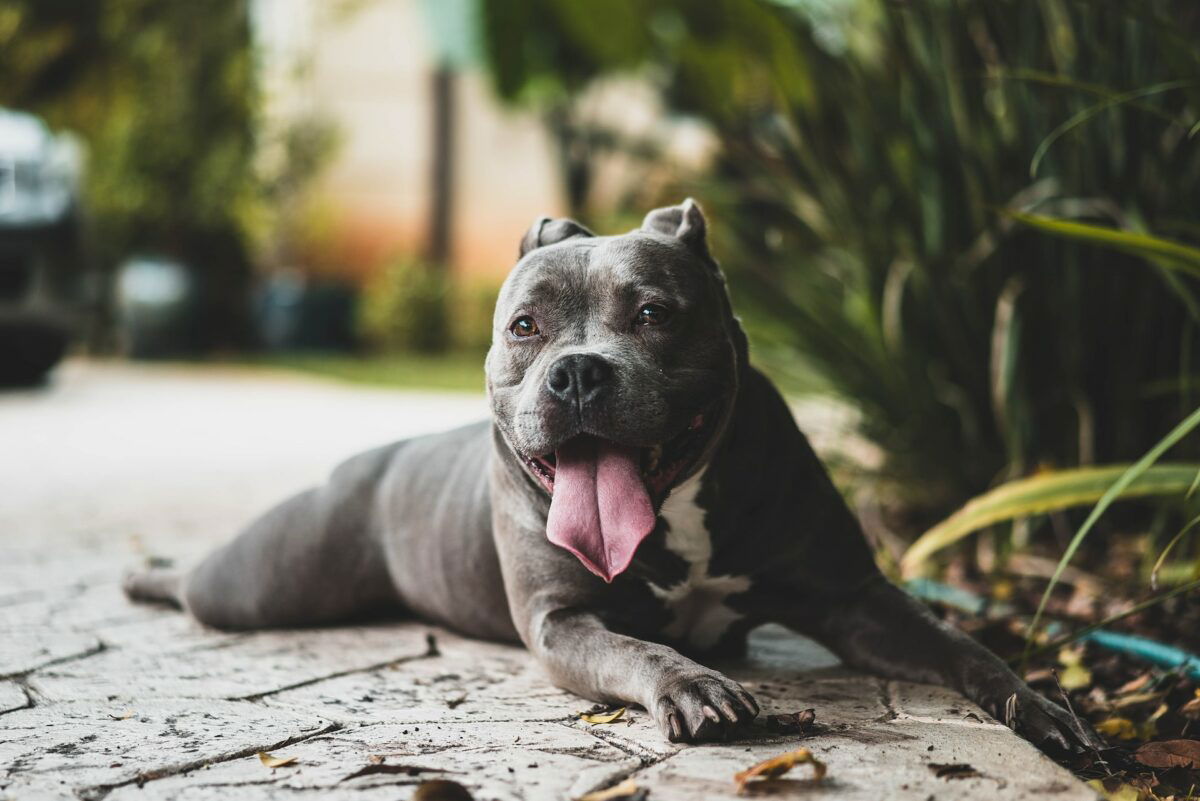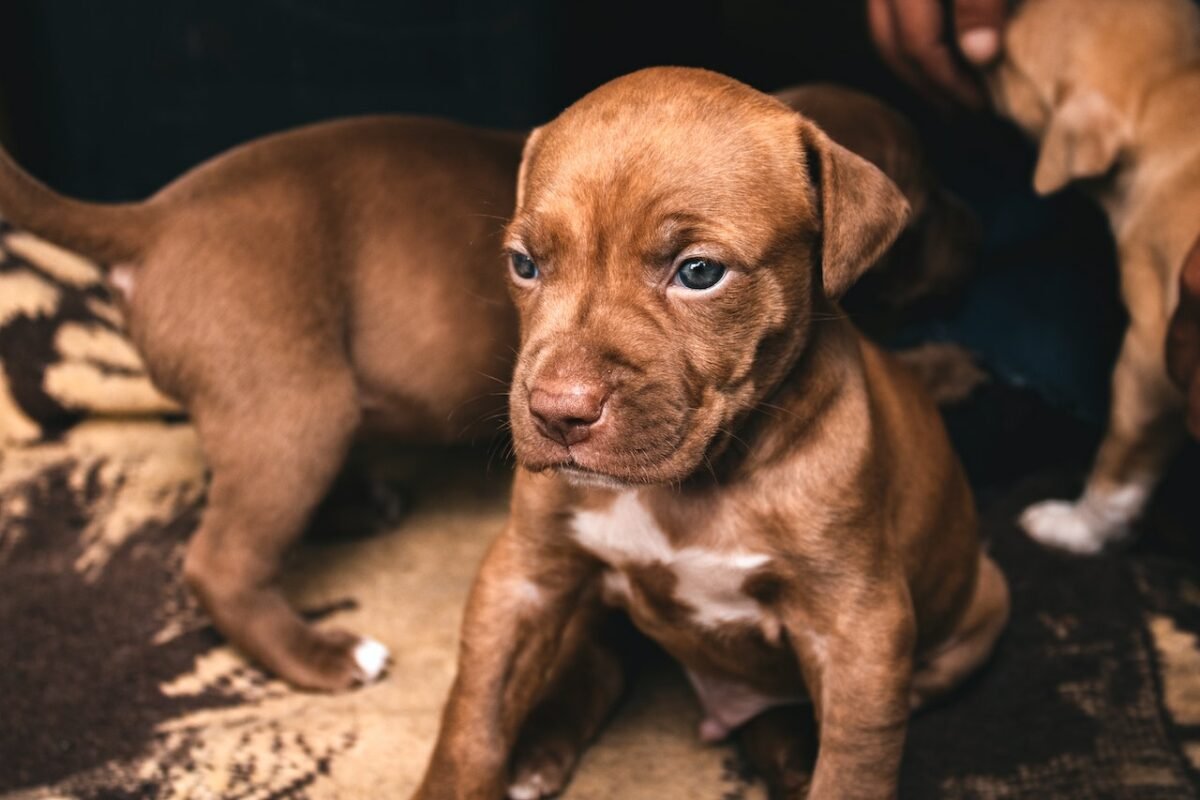We're an affiliate
We hope you love the products we recommend! Just so you know, we may collect a share of sales or other compensation from the links on this page at no additional cost to you. Thank you if you use our links, we really appreciate it!
As a current or aspiring Pitbull owner, you need to understand the potential litter size your dog can have for early preparation.
Puppy parenting is an exciting journey, yet one that catches some dog owners by surprise because of the unexpectedly large litter size.
Keep reading this blog as we unpack the average size of a Pitbull litter, factors affecting the size, and the whelping process.
What is the Typical Range of Pitbull Litter Size?
The average size of a Pitbull litter can range between 5 to 10 puppies, depending on several factors affecting reproductive health and breeding.

Some Pitbulls have however been reported to have more than ten puppies, a good example is Tippy, who delivered 16 healthy puppies in one litter on April 1, 2000.
The exact number of puppies you can expect will vary from one Pitbull to the other, depending on various factors.
Factors Affecting Pitbull Litter Size
Although most Pitbulls can have an average of five puppies in their first litter, there are some factors that can influence this size, including:
1. Breed standards and variations
As you may already know, the term Pitbull does not refer to a standalone dog breed but it is rather a collection of breeds with comparable traits.
The average litter size may vary across the different Pitbull dogs, depending on their reproductive maturity level, physical capabilities, and breeding traits.
Most people use the term Pitbull to refer to the American Pitbull Terrier, which may have attained early maturity compared to the American Bully, American Staffordshire Terrier, and the Staffordshire Bull Terrier.
In addition to the individual traits of the different Pitbull dogs, ethical breeders are bound by different breed standards that may vary in different nations.
The breeding standards are set by a national organization of a particular breed to ensure that dogs are bred with the desirable qualities that maximize their overall well-being.
The breeding standards can slightly vary the number of puppies produced in one litter across the different Pitbull dogs.
2. Age and health of the dog
The age and overall health of the Pitbull parents can greatly affect the number of puppies conceived in one litter.
Younger Pitbull females in their first or second heat cycle may give birth to five or more puppies in one litter.
This number will however decrease as they get older. When your Pitbull hits above 5 years, she will most likely conceive a minimum number of puppies.
The health of the dog plays a vital role in ensuring they conceive properly and deliver a good number of puppies in one litter.
An underweight female Pitbull with a health problem may have troubles during the whole pregnancy period and this may reduce the number of potential puppies per litter.
Your female Pitbull should be in good health condition both physically and emotionally before considering her for breeding.
Over and above the overall well-being of your Pitbull mother-to-be, their reproductive health is of great importance to ensure a smooth journey from conception to whelping.
3. Nutrition and care
The nutritional care given to a female Pitbull can greatly affect the number of puppies she can potentially have in one conception.
You need to offer your dog a balanced diet with a nice mix of all the necessary nutrients and minerals for proper fetal development.
Your vet nutritionist may recommend some prenatal vitamin and mineral supplements to boost your dog’s health and that of their upcoming puppies.
Expectant Pitbulls should be kept under regular watch by the vet to detect potential issues that could affect the litter size and puppies’ health.
4. Breeding Practices
The practices adopted by a dog breeder have a direct relation to the litter size achieved by the potential mother Pitbull.
Breeders driven by work ethics will only prioritize the desired character of the dog when breeding without focusing on the potential litter size.
Unscrupulous dog breeders on the other hand are in this business just to make some quick money from the rearing of dogs.
They don’t care about the mommy Pitbull’s health and will do anything possible to maximize the number of puppies conceived in one cycle.
They can also force female Pitbull to breed too soon or frequently, and this may subsequently lead to reduced litter size and bad health for the upcoming puppies.
We strongly advise that you go for ethical breeders when planning to add a new furry member to the family.
5. Average Pitbull litter size
The average Pitbull litter size can fall anywhere between 5 to 10 Pitbull puppies, but this is not by any stretch a blanket statement for all expectant Pitbull out there.
In addition to the other factors highlighted above, you should keep in mind that every dog is an individual and each one can have different litter sizes in every cycle.
A variation is always seen across the different Pitbull breeds in terms of their average litter size but it does fall far from the expected range.
How to Maximize a Pitbull Litter Health and Size
1. Pre-breeding preparation
We strongly advise taking your dog to the vet’s office for a pre-breeding health check and in-depth examination.
A complete medical screening during this stage involves a comprehensive physical exam, blood work, and fecal exam.
It’s during these checks that the vet can detect health problems affecting your Pitbull with the potential of slowing down conception and affecting the puppy’s health.
You also need to ensure your dog is up to date with their vaccination schedule, to ensure they’re healthy throughout the gestation period.
The vet will examine your dog’s medical record to confirm if your canine friend has received all the necessary shots in time and administer the pending ones.
2. Prenatal care
Once the pregnancy of your Pitbull is confirmed, you should adjust to provide them with the necessary pre-natal care to support their health and that of the upcoming puppies.
Your vet will advise on a proper diet plan that focuses on the energy needs of the Pitbull mother-to-be, and the nutritional demands of the conceived young ones.
Remember to take your dog out for regular gentle exercise even during the gestation period. You may have to reduce the intensity of the exercises to make it manageable for the Pitbull.
Working out helps to keep the dog healthy and in good shape as they prepare for delivery in a few weeks.
You may also have to adjust your dog’s immediate environment to make sure it’s free from noise and human traffic.
A highly disturbing environment or abrupt changes can elevate the stress levels in your dog, impacting the health of the upcoming puppies.
3. Monitoring the pregnancy
You should monitor your pregnant Pitbull right from conception through to the final day when delivering and even after having the puppies.
Your vet may have to come and check your dog in-house for potential health issues if the circumstances don’t allow your beloved Pittie to travel far.

Always watch out for any negative signs such as excessive fatigue, loss of appetite, or any other unusual behavior, and report them to your vet.
Chat with your vet as soon as your gestating Pitbull shows any sign of severe distress such as continuous whining, breathing heavily, or difficulty in getting up.
4. Whelping process
Expectant Pitbulls can carry a litter for an average of nine weeks – spread out in different stages from conception to labor.
As a caring Pitbull parent, you need to be prepared for the big day by knowing the complete stages of labor and delivery.
Even though most Pitbulls can give birth on their own without external assistance, we suggest watching over them carefully, especially when labor kicks in.
The following are the stages of labor experienced by whelp-ready Pitbulls:
Stage 1: Contraction
This is the first stage of labor, where your expectant Pitbull may appear completely restless and may show decreased appetite, pant excessively, nest their bedding, dig, and even vomit.
Early labor can typically last for an average of 12 hours in Pitbulls, but this period may vary depending on the individual dog.
Stage 2: Strong contractions and actual birth
Intensified contraction may start to kick in during active labor as the puppies start to make their grand exit from the placenta to enter their new world.
This second labor phase is characterized by watery discharge on the Pitbull’s vulva.
A healthy Pitbull can deliver one puppy in intervals of 30 to 60 minutes, with 10 minutes of tough straining
If your Pitbull is straining excessively for more than 1 hour, you need to seek assistance from a qualified vet.
Most Pitbull puppies are born head-first, but it is completely normal for some to come out tail-first.
Stage 3: After birth
The last stage is usually the expulsion of the placenta (fetal membranes), which typically occurs within 15 minutes of each puppy’s delivery.
A normal placenta should be greenish-black in color and it should not have a foul smell.
Make sure to count the number of placentas delivered to ensure that none is remaining in your dog’s uterus. The number should match the size of the litter.
Your new Pitbull momma can have vaginal discharge made of traces of blood and fetal membrane (lochia) for about 5 days after delivering, but it should not have a foul odor.
The vaginal discharge will get thinner in subsequent days and it may come out with a pink or light brown color.
If your dog expels a dark and smelly discharge from the vaginal canal after more than 24 hours of birthing, then you can suspect a rare condition known as retained afterbirth.
Retained afterbirth is a disorder where an affected dog fails to flush out all fetal membranes from their womb.
In addition to smelly discharge, some of the other symptoms of retained afterbirth in Pitbulls are fever, neglect of the puppies, stress, and general body weakness.
Assisted delivery (conditional)
If your Pitbull is straining too hard or if they’re in immense pain to deliver, we suggest seeking a veterinarian for assisted delivery.
How Long Do Pitbulls Stay Pregnant?
How long does a Pitbull take to have Puppies? The normal gestation period for a healthy Pitbulls averages 65 days, which roughly falls within the range of most other dog breeds.
The gestation period in dogs begins at conception, which makes it hard to predict the exact day of delivery because conception can take place a few days after mating.

The period of pregnancy in Pitbulls may also vary depending on the litter size. The more the puppies conceived, the longer the gestation period.
It’s also worthwhile to note that every dog is unique. Some Pitbulls may deliver earlier while others can take much longer depending on individual factors.
At What Age Can a Female Pitbull Breed?
Sexual maturity in Pitbulls occurs between the ages of 6 to 9 months, but it does not mean that you breed them at this stage.
It is generally recommended to wait until your Pitbull completes her first heat cycle before breeding.
On the question of how old a Pitbull has to be to breed, Destini R. Holloway, DVM suggests that the ages between 1 to 4 years are best suited for finding a mate for your female Pitbull.
Female Pitbulls within this age bracket are considered mature physically, emotionally, and mentally.
The pregnancy journey in dogs comes with a lot of demands, making it important to wait until your dog is mature enough to handle the whole process.
A physically fit and grown-up Pitbull is capable of carrying puppies and delivering them successfully without assistance.
Breeding immature Pitbulls may put excessive stress on their undeveloped bodies and they may have to strain hard to deliver their young ones.
After a year, your female Pitbull is likely to experience regular estrous cycles, thanks to the fully developed reproductive system.
Frequently Asked Questions (FAQs)
1. Can a Pitbull have 14 puppies?
Yes! It is possible for some large Pitbulls to conceive 14 healthy puppies in one litter. This typically occurs in a second pregnancy when reproductive health is at its peak.
2. How many puppies can a pitbull have in their first litter?
The first litter of most Pitbulls can have an average of between 5 to 10 puppies depending on several factors such as age and overall health of the expectant mother.
It’s important to note that the first Pitbull puppy pack is usually smaller than the subsequent ones.
3. Are there ways to increase the chances of larger pitbull litters?
If you’re planning on maximizing the litter size of your Pitbull, most veterinarians recommend putting your dog on an extra protein diet for a year before breeding.
Adequate prenatal care with regular visits to the vet can also increase the chances of maximizing the size of your Pitbull’s litter.
Even though it’s practically impossible to dictate the size of your dog’s litter, make sure to breed them during their prime period between 2 to 5 years of age.
4. How soon can I breed my pitbull after her first litter?
It is generally recommended to wait until your Pitbull mother has fully recovered from her first birthing experience before breeding them again.
An average Pitbull can take up to several months or even a whole year before regaining her normal weight after delivery.
Breeding a young Pitbull mother too soon after delivery can significantly increase the risks of various health complications and the stress of carrying another pregnancy before recovery.
Conclusion
We hope that this post has provided all the answers you needed to know the number of puppies a pitbulls can have.
Just to recap, an average Pitbull can deliver as few as 5 puppies in one litter to as many as 10, depending on several factors affecting reproductive health.
If you have an expectant Pitbull at home, we suggest monitoring them through their pregnancy journey and watching out for worrying signs of stress or pain.
We also suggest keeping your mind open and being ready to welcome whatever number of puppies your Pitbull mother gifts you.
Laura is the founder of Furs'n'Paws. She is a also a pet writer and expert with more than 20 years of experience of working with dogs and cats. She developed a very strong love for animals at a young age. Her passion led her to establish a thriving pet sitting and dog walking business in Dubai. As an expert in pet training, behavior, and nutrition, Laura is committed to helping pet owners and pet lovers by offering high-quality information on a wide range of topics.



No responses yet